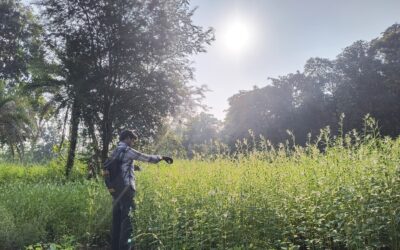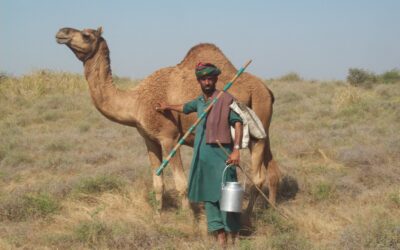“Everything we hear is an opinion, not a fact. Everything we see is a perspective, not the truth.” – Marcus Aurelius
Bihar, the land of the great Chanakya, Chandragupta Maurya, and Ashoka, was once the most advanced kingdom in the world, attracting scholars from far and wide. But over the centuries, its fortunes changed drastically, and it became synonymous with crime and corruption.
When I was selected for the India Fellow Social Leadership program, I was specifically told that I wouldn’t have the liberty to choose my work or location. The decision would rest entirely with the India Fellow team. I remember telling my friends and colleagues, “I’ll go anywhere but Bihar; if I’m placed there, I’ll leave the fellowship.”
Initially, I was assigned to Udaipur, but due to ideological differences, both the India Fellow team and the host organisation mutually decided after several discussions that a new placement would be better. And so, destiny intervened—I was sent to Muzaffarpur, Bihar. Having already used my ‘lifeline’ once, I couldn’t refuse.
What To Expect
I called a few senior journalists to get a sense of what I was walking into. They all said the same thing: “If you haven’t been to Bihar, you haven’t seen anything. Don’t miss this opportunity.” My family was anxious. To be honest, so was I. After years of living in metro cities like NCR, Pune, and Mumbai, how was I supposed to adapt? The images in my mind were intimidating—no clean water, constant power cuts, unsafe streets. I even packed off my gold rings and chain with a friend, asking him to send them to my mother in Bhopal. I wanted to travel light, both physically and mentally.
But nothing could’ve prepared me for what I saw after the tiring 30-35 hour journey. Muzaffarpur station wasn’t the chaotic mess I imagined. A short ride from my office were KFC and McDonald’s and the housing societies resembled those in Udaipur. This wasn’t the Bihar I’d imagined. In the two and a half months I’ve spent here, I’ve travelled to villages, met countless people, and tried to understand this place. I’m still learning, but here’s what I’ve seen so far:
1] The Land Of Kumars & Kumaris
Eight out of ten people I’ve met use Kumar or Kumari as their last name. This was surprising because caste identities seem to matter less here than in other states. People are judged more on their work than their lineage. While Biharis offered no specific explanation, some from Uttar Pradesh shared a backstory.
By the late 90s, casteism in Bihar was rampant, with upper castes exploiting lower castes. When Lalu Prasad Yadav came to power in 1990, he vowed to prevent upper castes from monopolizing government jobs. If a suitable candidate from the lower caste wasn’t available, positions often remained vacant. To avoid discrimination, many upper-caste individuals started adopting the neutral last names, Kumar and Kumari. Those belonging to the lower caste were already doing this to protect themselves. Over time, it became a norm across most of the castes. It became the way of shedding ones’ caste identity.
While Lalu Yadav’s time in power helped reduce caste-based discrimination, it was also marred by the devastating ‘gunda raj.’ One heartbreaking example is the case of Champa Biswas, the dalit wife of a senior IAS officer in Bihar. She courageously spoke out about how, for two years, not only she but also her family members and servants were brutally raped by the son of one of Lalu’s closest associates. If an IAS officer could not protect his own family, it’s chilling to imagine the vulnerability of those with no power at all during that time.
2] Liquor Ban: A Boon For Many, A Curse For Some
Since arriving here, I haven’t seen a single drunk person. The liquor ban in Bihar is strictly enforced. If someone is caught carrying alcohol or appears drunk, they face hefty fines or immediate jail time. Even in the villages, most men avoid drinking, not even indulging in locally brewed liquor. This has had a positive impact on many families. Cases of domestic violence have decreased, and women, often left in charge while their husbands migrate to other states for work, have taken on more leadership roles at home. Men, on the other hand, tend to avoid returning unless it’s for a major event like Chhath Puja.
But the ban has also brought unintended consequences. In border villages like Sitamarhi, kids as young as six are getting addicted to drugs and being drawn into smuggling liquor from Nepal. They’re paid more in a day than their families earn in a month. Parents, driven by desperation, are pulling their kids out of school and into this dangerous trade. It’s heartbreaking to see a policy meant to help inadvertently trap the next generation in a cycle of crime.
3] Clean Villages, Dirty Cities
I’ve visited over ten villages so far, and I couldn’t help but notice how much cleaner they are compared to urban areas like Muzaffarpur and Patna. This was something I didn’t expect, especially since the situation is quite different in Madhya Pradesh, my hometown.
In the villages, there’s minimal littering. The streets and common areas are well-maintained, and I rarely see garbage piling up. This might be because of several factors: the lower population density means less waste, and most of what is generated—like food scraps, leaves, or dung—is biodegradable. People also seem more conscious about their environment and tend to dispose of waste responsibly.
In contrast, the cities such as Muzaffarpur and Patna are a completely different story. The streets are often littered, even in so-called posh areas like Mitthanpura in Muzaffarpur. I was expecting better infrastructure and waste management in such areas, but it’s disappointing. Finding a dustbin is like searching for a needle in a haystack. In many markets, even large ones, there are no dustbins in sight. Shopkeepers and residents seem to have accepted this as normal, and instead of properly disposing of waste, they simply toss it onto the streets.
Yet, despite this, the road infrastructure stands out. From well-maintained highways to decent village roads, it’s better than what I’ve seen in many other states.
4] We Over I
There’s something special about the people of Bihar. Even when they’re fighting or disagreeing, there’s a certain respect, a sense of humanity that’s hard to miss. It’s so different from places like Delhi or Mumbai, where life feels rushed, and people often seem caught up in their own worlds. Here, they use “hum – we” instead of “main – I.” And the more time I spend here, the more I realize it’s not just a way of speaking—it’s a way of living. It says, “We’re in this together and no one’s coming to save us, so we have to stand by each other.”
This mindset makes sense when I look at life here. Floods destroy homes year after year. Corruption eats away at progress. Jobs are hard to come by, and opportunities feel like a distant dream. But instead of breaking people, these struggles pull them closer.
People of Bihar know survival isn’t about going it alone—it’s about showing up for each other, whether it’s sharing what little you have or just being there in tough times. Take a train journey, for example. Even if you have a reserved ticket, you’ll often hear someone say, “Thoda adjust kijiye (please adjust a little)”. It’s not about ignoring rules or being inconvenient, it’s about a culture where resources are shared because they understand that not everyone has the same access or privilege. It’s a way of saying, we’ll make room for each other, even when there isn’t any.
5] Great Speakers, Not-So-Great Listeners
Biharis, I’ve met so far, are great speakers, often full of passion and conviction when sharing their thoughts. However, they’re not always the best listeners. At first, I thought this meant they weren’t interested in hearing what I had to say, perhaps because they didn’t see me as experienced or knowledgeable enough. But over time, I realized that this wasn’t just about me—it was part of a larger pattern.
Even when talking to their friends, family, or colleagues, many from Bihar tend to dominate conversations, often interrupting others mid-sentence to make their point. This habit is also influenced by the fact that many of them, at some point in their lives, have prepared for competitive government exams—like the UPSC, BPSC, etc. Having undergone such rigorous preparation, they often come to believe that others, especially those who haven’t been through the same experience, might know less.
While this habit can be frustrating at times, I’ve come to see it as a part of their unique energy—a fiery determination to make their voice heard. And when I step back, I realize that behind this trait is a love for sharing and engaging, even if the balance between speaking and listening isn’t always perfect.
These are my first impressions, and they come with the biases of an outsider looking in. It will take time, humility, and consistent effort to peel back the layers of this complex state and truly connect with its people. I’m starting to realize that acceptance won’t come overnight, nor should it. Trust is earned, not given, and I need to keep showing up, listening, and learning. So, consider these observations a work in progress. Take them with a pinch of salt, as they’re shaped as much by my preconceived notions as by the realities on the ground. Bihar has a long way to go in some areas, but so do I.





0 Comments